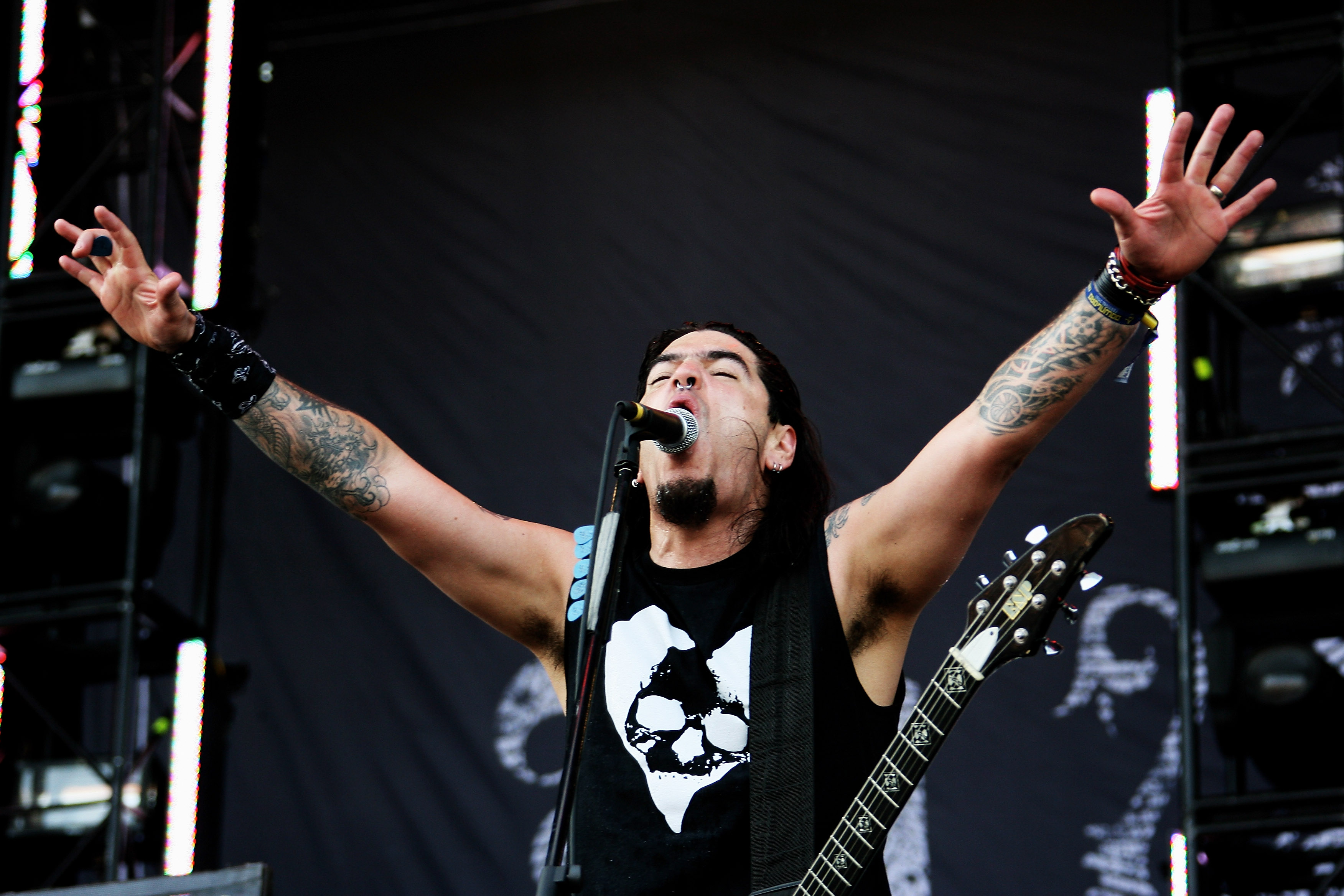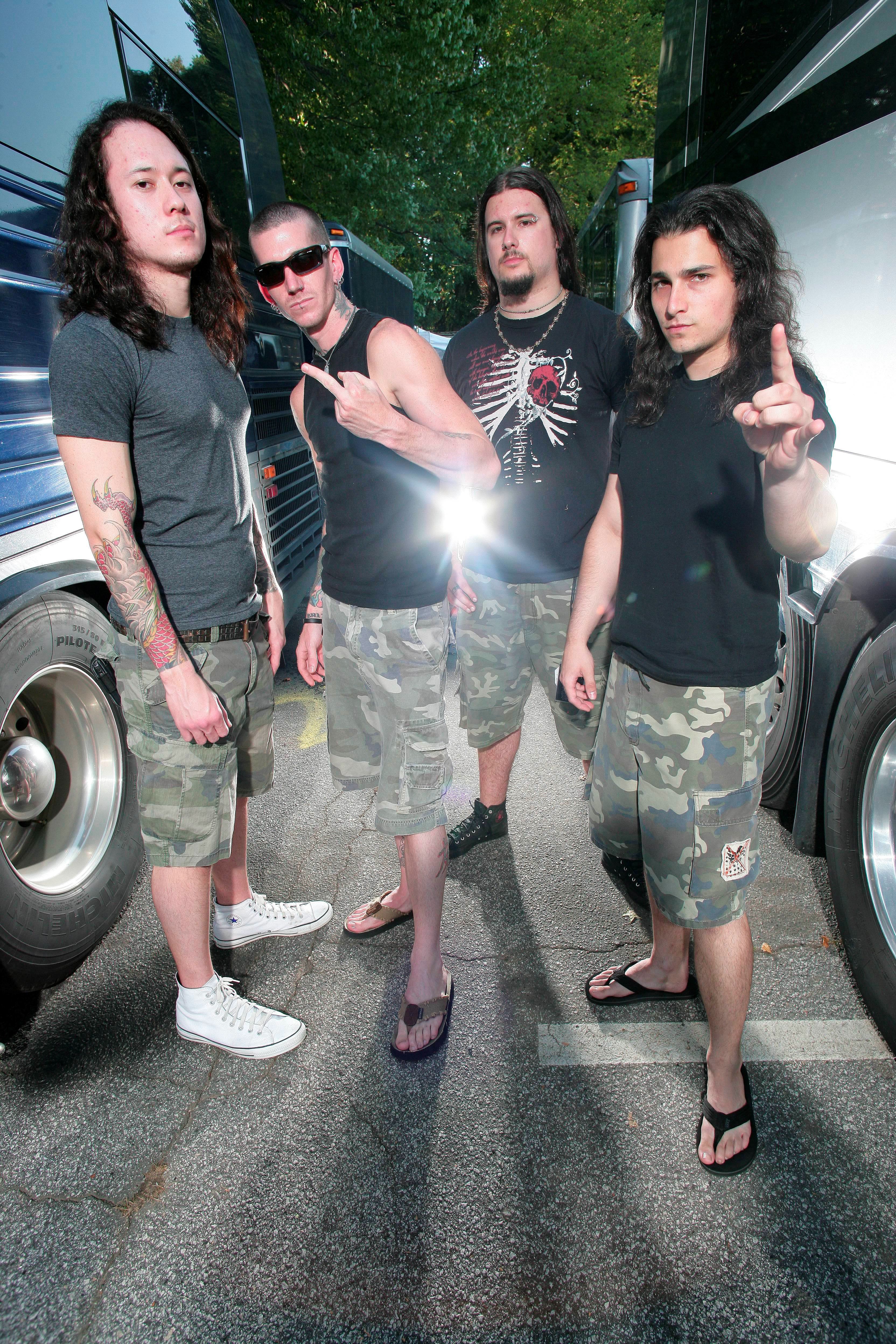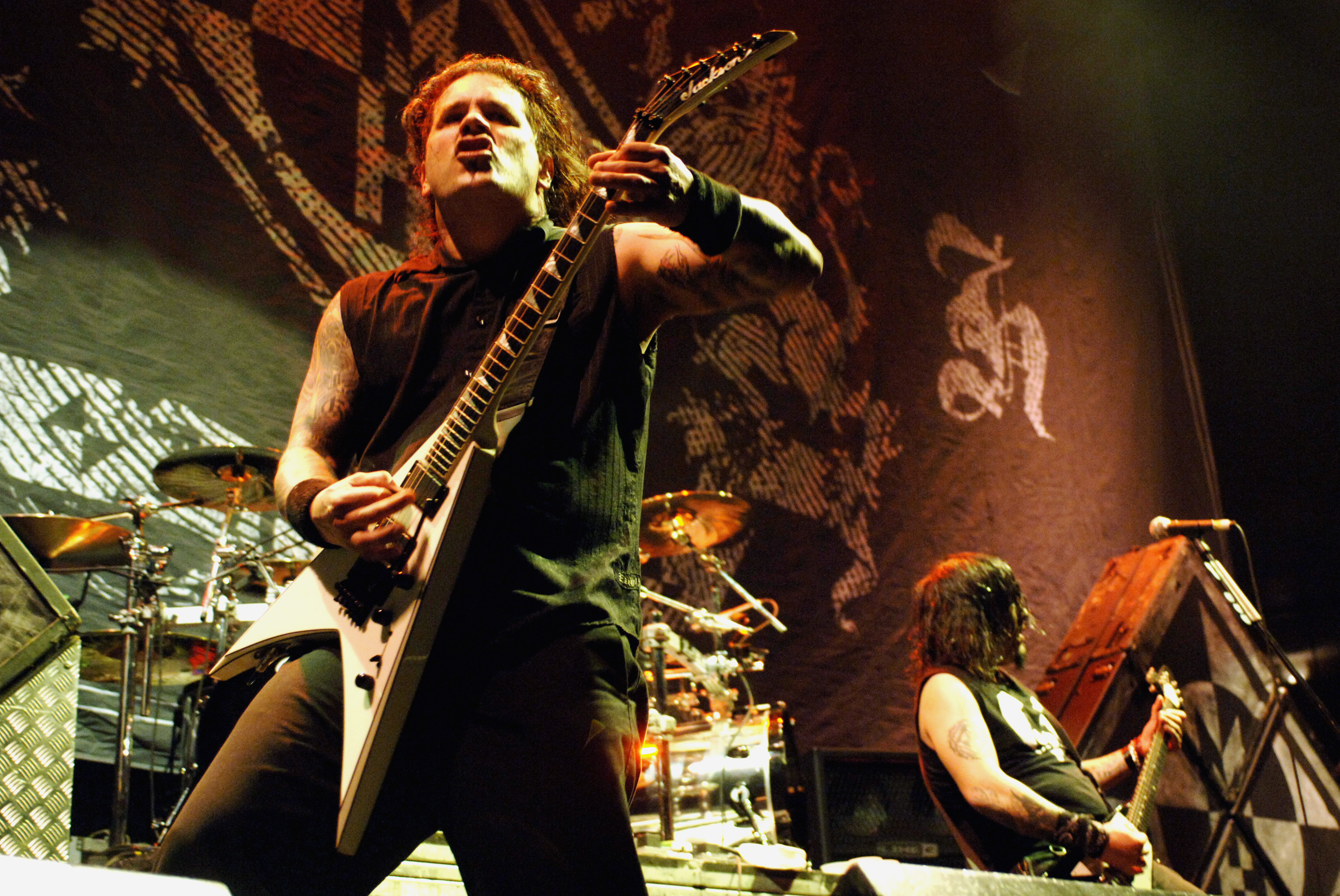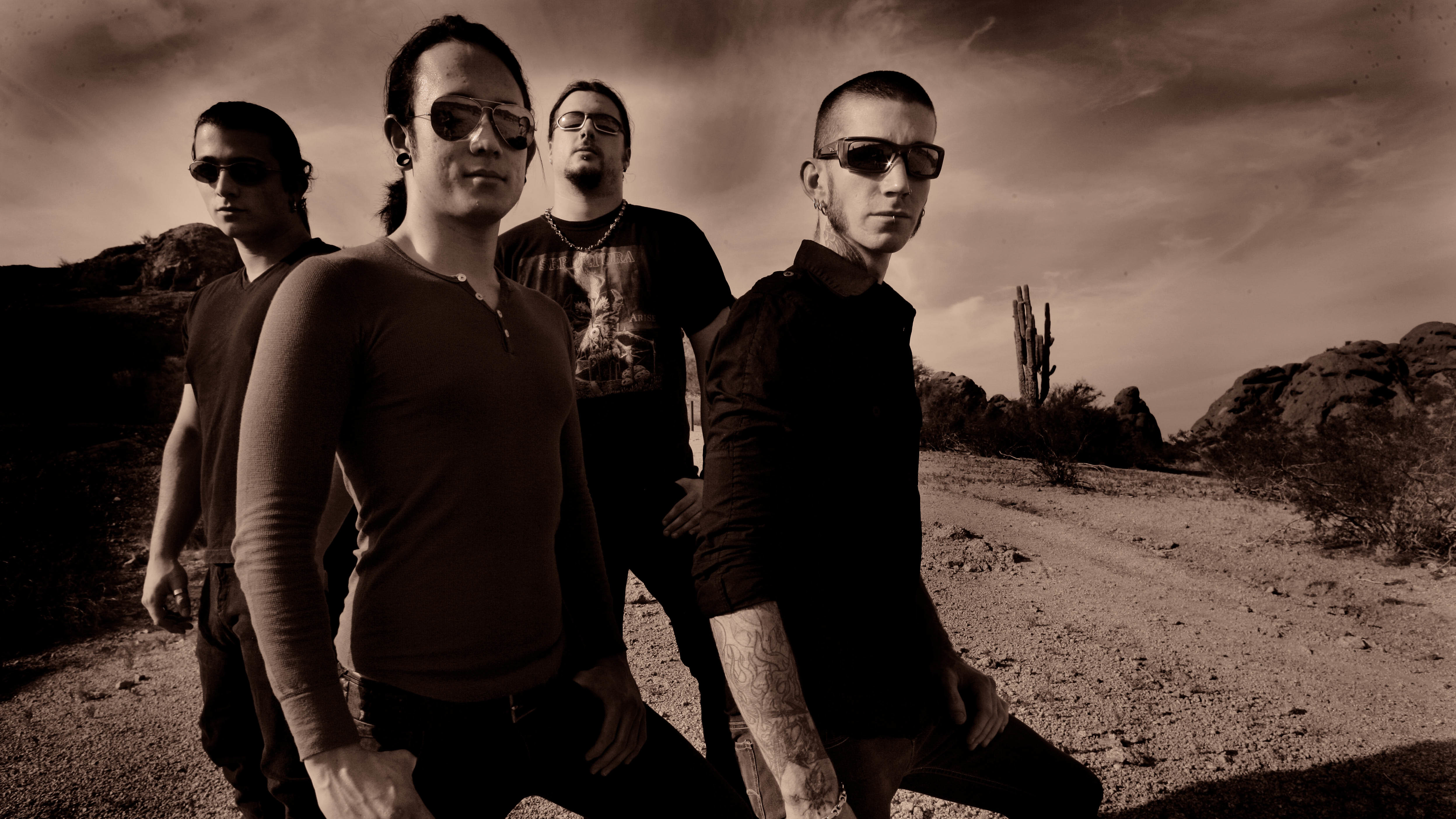This article originally appeared in Metal Hammer #172.
In 1999, 13-year-old Matt Heafy went to his first metal show and had an epiphany. Oakland’s Machine Head were playing Orlando, Florida – just outside of Heafy’s hometown – in support of their third full-length, The Burning Red, and the future Trivium frontman was hooked. “I went to that show with my dad, who is Trivium’s manager now, but I wasn’t even in Trivium at that point,” he says. “I couldn’t get the chorus for the song Silver out of my head, so the next day I made my mom drive me to the record store to get it. Then I went home and started jamming on all those riffs.” Heafy joined Trivium the following year and the band has since skyrocketed to international prominence. Though the band itself has reaped both praise and scorn in seemingly equal amounts.
Machine Head vocalist-guitarist Robb Flynn can relate. When he started the band in 1992 after bailing on Bay Area thrash merchants Vio-lence, Machine Head became overnight sensations. Their 1994 debut, Burn My Eyes, was a crossover favourite of the time, popular with both old school thrash fans and a younger audience that was already leaning toward the more commercial sounds of the burgeoning nu-metal scene. But many thought Machine Head went soft with 1999’s The Burning Red – which, ironically, Heafy cites as his favourite. “We took some chances that we were terrified to fucking take on that album,” Flynn says today. “Especially with the song The Burning Red, which was just a mellow guitar and a vocal. And now it’s one of the most requested songs we have. I’ve seen people cry in the audience to that song. But it’s almost like journalists want me to apologise for it. It’s like, ‘Fuck you – I ain’t apologising for shit’.” It’s unlikely that Flynn will experience a similar backlash with Machine Head’s latest, The Blackening, which has been almost universally lauded in the international metal press.

HEAFY: “I’m sure you’ve been asked this many times, but I’m curious: Where did the name Machine Head come from?”
FLYNN: “Well, people usually think that we took it from the Deep Purple album, but it didn’t actually come from that. At the time we decided on the name, none of us even knew that Deep Purple had an album called Machine Head. We just thought the name sounded cool – it didn’t sound like anything you could put a tag on, you know? Some bands have names that make it obvious what genre they’re in, and we wanted something a little more flexible. Where did the name Trivium come from? I actually don’t even know what it really means.”
HEAFY: ”Trivium is Latin for the three-way intersection of the three schools of learning – grammar, rhetoric, and logic. There’s also a biblical meaning, but I’m not sure what it is. The original singer came up with the name, but we liked it, so we kept it. So I guess it doesn’t have a personal meaning for any of us.”
HEAFY: “I wanted to ask you about how so many bands seem to rely on studio technology these days. Sometimes when I’m home I’ll turn on MTV2 during the day, and it’s amazing how fake some of the bands sound – it’s like they’ve got a friggin’ Casio keyboard on vocals or something. It doesn’t even sound like a human being. But I think a lot of the fans have no idea. What’s your take on that?”
FLYNN: “I know what you mean. I grew up listening to a lot of punk rock, and that was always the other side of metal. There was a point where metal really went into being perfect, but punk rock was always about attitude. Bands like Poison Idea, Attitude Adjustment, Verbal Abuse – West Coast hardcore stuff like that, or even British bands like Discharge or Broken Bone – made a huge impression on me because they were playing these brutal riffs, but it was really sloppy. But it was beautifully, perfectly sloppy, you know? And I always thought that was cool.
“One of the reasons that Machine Head started doing harmonics was because when I started learning how to play guitar, I’d hear these punk rock bands – or even a band like Celtic Frost – they’d stop, and there’d be all this feedback before they went into the riff again. And I was playing on this five-inch amp with a guitar that I rented from the music shop – you could rent one for like $45 a month – and I couldn’t make feedback out of that combination of amp and guitar. So when I was playing along to those records, I’d play a harmonic when the feedback parts came in. Eventually, I started incorporating that into a style with Machine Head. It came from a complete fuck-up on my part.”
HEAFY: “A lot of newer bands don’t really have a specific sound that’s all their own. There isn’t something there that’s memorable. But that harmonic thing you’re talking about is something that lets you know that it’s a Machine Head song. I remember the first time I saw you guys live – my first metal show ever was a Machine Head show…”
FLYNN: “That rules, dude.”
FLYNN: “Luckily, I have another guitar player who’s actually playing as well [laughs]. The one thing that’s always impressed me about you guys is that your live show sounds so close to your album. The precision of it is impressive, because you guys are playing some really fucking intricate shit.”
HEAFY: “Thank you very much.”
- Machine Head: how four obnoxious party boys became a metal powerhouse
- Thinking Out Loud: Machine Head’s Robb Flynn
- Why I love Boston's debut album, by Trivium's Paolo Gregoletto
- What happened on Trivium's intimate European tour?
FLYNN: “Do you guys practice your asses off when you’re not on tour, or what?”
HEAFY: “On this break we just had – which was the first one we’ve had since 2004 – we had six and a half weeks off and I wasn’t planning on playing guitar at all. But for some reason, we all got inspired and we started writing for the next CD. So I didn’t really practice, but I was definitely writing. I’ve been trying to expand my vocals lately, trying to do some Halford falsetto stuff, but raspier. I was born a baritone, but I wish I was a tenor. I wish I had a higher natural singing range. It’s just what metal calls for sometimes.
“So, another thing I wanted to ask you about is the influence Machine Head has had on newer bands. There’s obviously Trivium and Bullet For My Valentine, but there’s countless more. How does it feel to be such a big influence on these bands that are doing pretty well nowadays?”
FLYNN: “It just makes us really proud, you know? That’s it. To think that we’ve had an impact on so many bands in the current climate – or even older bands – is great. I mean, I’ve had some of the guys in Slayer tell us they were inspired by us on their new album. We’re just flattered, you know? It’s a trip, but we try to keep our heads on planet earth. The longer we’ve gone on and the longer we’ve survived, the more bands seem to tell us that. I remember when we were doing the Roadrunner United thing Howard [Jones] from Killswitch [Engage] told me how him and his buddies followed Machine Head around for a week on The More Things Change tour. I was like, ‘Whoa…’ because we’d never even met before. I don’t know – maybe there’s a part of me that’s insecure or wants to keep a self-deprecating sense about them – but I often think people don’t even know who the band is. But that’s the way it works, I guess – we were influenced by the Panteras and the Slayers, and we’re now passing the torch down to another generation and keeping it alive. And we’re passing it to able hands with Trivium.”

FLYNN: “Hey, you know what I always wanted to know? Did you ever do speed to get your guitar playing as fast as it is?”
HEAFY: “No! [laughs].”
FLYNN: “You’ve never tried speed?”
HEAFY: “Never. I went from never doing anything and saying I wouldn’t even touch caffeine to drinking booze and smoking weed for a while. But weed made me crazy and made me eat way too much. I tried coke like twice and that wasn’t for me, either. But playing an instrument while intoxicated gets boring, I think.”
FLYNN: “Who would you consider to be the best shredder guitar player out there now?”
HEAFY: “Well, I’d say John Petrucci from Dream Theater is one of the best. And Jason Becker is one of the greatest guitar players ever, I’d say.”
FLYNN: “Who’s that?”
HEAFY: “He used to play with Marty Friedman from Megadeth in band called Cacophony. He’s actually got Lou Gehrig’s Disease now – he can’t even play guitar anymore. But he did this one album called Perpetual Burn that I think is one of the most insane guitar albums ever.”
FLYNN: “I think my favourite dude right now is Alexi [Laiho, from Children Of Bodom]. I think he’s the sickest shredder – he’s got tasty chops and he’s clean as fuck. And I think the other guitar player in that band is the second-best shredder.
“So here’s another thing I wanted to ask you about: We’ve toured together twice at this point, and you guys get a surprising amount of people at your shows who aren’t necessarily fans. How do you cope with that?”
HEAFY: “You know, I think every new band gets the ‘This band sucks – I’ve never heard of them’ kind of thing, but when we started getting into the public eye and people knew who we were, I think Trivium kind of became that band. I know a lot of people say this about their own bands, but I say this from experience: I think you either love Trivium or you hate us. There’s not a lot of in between. The first couple of times those things happened, it was really hard – it really hurt me. Yeah, shit happens at our shows, and you were there to witness one of better ones, when we got those ‘Trivium sucks!’ chants in your hometown.”
FLYNN: “Yeah. Just to recap for the readers, I went to see Trivium play in Oakland with Children Of Bodom and Amon Amarth. I came in all excited because I hadn’t seen you guys in a while. Amon Amarth had just finished and you guys were getting ready to go onstage and all of a sudden this humongous chorus of probably like 50 people started a ‘Trivium sucks!’ chant. But I didn’t realise what they were saying. You looked at me and said, ‘Dude, they’re saying Trivium sucks!’. And I was like, ‘No way…’. Then I listened a little more closely, and it was true.
“I remember you guys were understandably freaked out. And when you went out there, it fucking didn’t stop. But you guys kept right on playing. I remember a couple of times when you just unloaded on some people and just called them out hella hard. I gotta say, dude, all things considered – you played a 45-minute set to one of the most hostile crowds I’ve ever seen a band play to – and you guys fucking delivered. You stood your ground. I was so proud of you guys – I don’t know if anyone would have handled it any better. I don’t know if I would’ve handled it as well as you guys did.”
FLYNN: “It’s definitely life in fast forward. You experience so much more of everything – positive and negative – than so many other people just by the fact that you’re travelling and meeting new people every day. I wouldn’t have it any other way, though. Our first three tours were with Napalm Death, Obituary and then five months with Slayer. And dude, if those weren’t sink-or-swim tours, nothing was. There were literally nights when people wanted to fight us, dude – like, ‘Go back to Oakland, pussies!’. Especially on that Napalm Death tour. There’s about two seconds of singing in Blood For Blood which is otherwise a full-on fuckin’ thrash tune – and everyone would boo all at once. So you take your knocks and you learn what to do and what not to do.”

HEAFY: “I got hit in the face with a shot glass once. That was a horrible night – we got three or four songs cut from our set, the power kept cutting out, I was screaming at the house monitor guy. When I got hit in the face with that glass, I just stepped to the mic and said, ‘I don’t give a fuck who that was – beat the fuck out of that kid!’. And that’s when a red flag went up. I went backstage after the show, and there were cops and security people waiting, like, ‘That kid got hurt. You’re fucked’.”
FLYNN: “Oh, man – that sucks… My problem was that I wouldn’t tell anyone to beat the fuck out of anyone else – I would actually jump offstage and beat the fuck out of people myself. Especially early on, we fought a lot with the audience. I remember cracking my guitar headstock over some dude’s skull. I used to wear hats onstage for a while, and people would come onstage and steal my hat off my head while I was singing. Finally, I chased one dude through the club while the band was still playing, tackled him down and started pounding him like, ‘Where the fuck is my hat?’. I remember he looked up at me and said, ‘I dropped it’ [Laughs].
“After that, it dawned on us that there was a lot of shit that could go wrong. A friend of mine – I won’t say what band he’s in – had a real bad experience once. Basically some dudes baited him, he beat them up, and they turned around and sued him because he’s a ‘rock star’. So we decided to stop fighting and just do a lot of drugs and drink a lot. [Laughs]. After a few times of having to stay overnight in whatever town we were playing just to fill out police reports, we were like, ‘This has gotta end’.”
HEAFY: “Nowadays, we welcome the negativity. As long as we’re having a good time, people can say whatever they want. And right now, it’s cool to hate Trivium. The thing is, it’s not in the fan world anymore – it’s in the band world. But that’s fine – we still respect those bands and jam out to them on the bus. If they wanna hate us, that’s okay. I think it’s a sign that we’re doing alright.”
FLYNN: “Yeah. It’s definitely hard when a band you admire doesn’t like you, though. For the last five years or so, Kerry King and I have had this very public beef. We recently squashed it, and it was cool to finally do that, because both he and I have so much respect for each other. And it’s not like I didn’t respect him during the time we had this beef. But you’d go to put on that record and you’d get this weird feeling like, ‘Fuck! What the fuck?’.”
HEAFY: “It’s hard when you meet a band on tour that you looked up to as a kid and they’re assholes. I’ve had that happen a lot on tour. They just end up being dicks or you hear about them talking shit, and it just sucks.”
FLYNN: “Yeah, and you just wanna tell them that, too, like, ‘Do you know how much money I spent on your fuckin’ shirts?’.”
